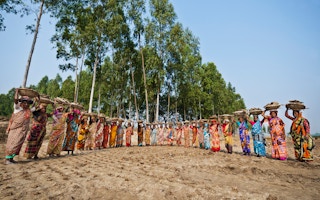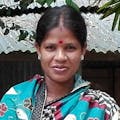My village, Tajpur, in the Lalmonirhat district of northern Bangladesh is very green and beautiful. It sits beside the river Tista and most of our community members work in agriculture.
The area is prone to flooding—every year the river bursts its banks. Climate change means we face droughts followed by heavy rainfall, which makes the flooding worse and many of the villagers live in poverty. It is a constant fight against these challenges, but I love my village and its hard-working people.
Frequent climate disasters and river erosion seriously damage our crops and productivity. We are not the causers of climate change, but we are seriously affected by it.
Like most of the women in my village, I work in our fields and homestead to produce different crops and vegetables. I also produce compost fertiliser. My husband, Shamchoron Bormon, is a carpenter, and we have two children, a boy and girl, aged 14 and eight-years-old. My mother and father also live with us. In the mornings, I prepare breakfast and get the children ready for school.
My husband drops them off. He works up to 20 days a month and for the rest supports our crop cultivation and helps with the family’s unpaid care work, such as looking after the children and my parents.
Since 2012, I have been the president of the Rajpur Women’s Federation, which consists of 20 groups, supporting 500 vulnerable and marginalised women. We have been working with ActionAid’s Promoting Opportunities for Women’s Empowerment and Rights (POWER) project since 2016.
It aims to increase their independence and income through climate resilient, sustainable agriculture, recognising and reducing the amount of unpaid care work women do and preventing violence against women.
We meet with women from different groups in the office where we provide training on leadership, women’s rights, preventing violence against women, communication and negotiating skills, financial planning and sustainable agriculture.
The patriarchal mindset is a big challenge for us to overcome in order to work with women in our communities. The villagers believe that women will stay at home and take care of children, older people and prepare food for the family.
We go into communities to meet with religious leaders, the men and boys, to discuss rights, women’s rights, unpaid care work and the opportunities of sustainable agriculture and how women can improve their family’s economic and social status.
Violence against women is one of the main issues we work with. Women in our communities are facing domestic violence, early marriage, child trafficking, rape.
We receive training on these issues to make women aware of their rights and work with the authorities and different agencies to make sure crimes are reported. We record all incidents and discuss these issues among our groups, there is solidarity.
Now we are not alone and we can fight until we get justice. We are taking awareness raising initiatives into communities, including an interactive theatre show and leaflets.
As well as helping women know their rights, our organisation is empowering them by providing training in sustainable agriculture techniques.
“
We are not the causers of climate change, but we are seriously affected by it.
We have established a seed bank and grain store to protect them from floods and natural disasters. We are using compost fertiliser and herbal pesticide instead of chemicals. The changes we have made have helped reduce costs and produce healthy, fresh vegetables like sweet gourd, Indian spinach, cucumbers and beans.
These are in high demand at our local market. Our farming methods are protecting the soil, water and biodiversity of our environment. My hope is to establish a market selling goods and produce grown by women at the Maraihaat Bazaar. This is helping our community to cope and adapt to the impact of climate change.
Today we are celebrating International Day of Rural Women. It is also the start of the annual Committee on World Food Security summit in Rome this week, where governments will gather to discuss rising global hunger and malnutrition.
I believe world leaders need to take the initiative and adopt sustainable agriculture and farming methods that protect the environment, reduce hunger and help prevent catastrophic climate change. My message to governments and the big companies that control industrial farming, is that climate change is already directly affecting many countries and increasing hunger and food insecurity worldwide.
I hope that by sharing my experiences, decision-makers will recognise the power of rural women to reduce global food insecurity and help to cut harmful emissions that threaten our livelihoods.
Santona Rani is the president of the Rajpur Women’s Federation, which works with ActionAid. This story was published with permission from Thomson Reuters Foundation, the charitable arm of Thomson Reuters, that covers humanitarian news, women’s rights, corruption and climate change. Visit news.trust.org.











